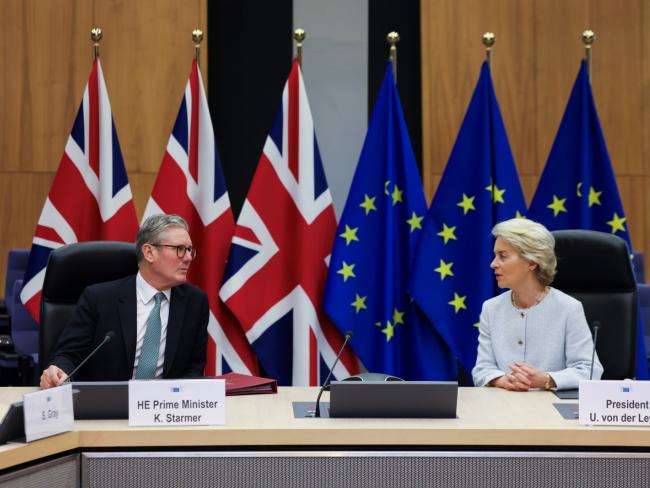8 May 2025

Getting closer. Keir Starmer meets Ursula von der Leyen, European Commission President, October 2024. Photo Simon Dawson / No 10 Downing Street via Flickr (CC BY-NC-ND 2.0).
Britain turned away from plans for a European army when we left the EU. But now Labour wants to join in again. And it will do so by the back door with a security pact, subordinating our own national security and defence interests to those of the EU. And naturally Britain will have to sign up to the founding values of the EU too!
On 19 May a UK-EU summit in London is expected to instigate a new strategic partnership. Keir Starmer and the Labour government describe this as a “reset” of Britain’s relations with the EU. It looks far more extensive.
Give nothing
The EU seems to be adopting much the same aggressive approach as it did during the protracted exit negotiations – give nothing and demand much in return. As well as the security pact, these talks are expected to include French demands for changes to fisheries arrangements and a youth experience programme bypassing immigration rules.
All these potential changes represent a loss of hard-won sovereignty. A defence pact will put Britain under the EU’s Third Country rules – participation on the EU’s terms and in areas of its choosing.
No debate
Starmer and his Europhile cronies want this UK-EU Security Pact, but without a public debate. Foreign Secretary David Lammy has hailed it as “a new era of security cooperation”, but it is widely seen as a backdoor re-entry to a form of membership.
“Such a decision could affect UK sovereignty and should be subject to a vote…”
The EU-critical organisation UK Defence Matters has drawn up a petition, which reads: “We are concerned that such a decision could affect UK sovereignty and should be subject to a vote of the whole country before it can be implemented”.
By signing this pact at the summit, Britain would agree to accept the jurisdiction of the European Court of Justice on defence and related matters.
Curtail independence
Britain would be obliged to participate in Permanent Structured Cooperation (PESCO) instead of the present voluntary arrangement. This would curtail our independence in several important respects.
As matters stand post-Brexit, Britain is theoretically free of the EU in both economic and defence structural constraints. That would change.
No consultation
The Labour government and its predecessor chose – without consulting the electorate – to cooperate with the EU over Ukraine on an ad hoc and voluntary basis only.

It doesn’t feel like that – the British government has been acting like an EU participant ever since war broke out – and the wages of British workers have been offered up to pay for the war “ for as long as it takes”.
But a security pact embeds that involvement – and the EU wants our money. We would be legally bound to invest through the European Defence Fund in ever-increasing shared capability projects, bolstering NATO as the USA steps back. There are now 68 collaborative warfighting projects under PESCO.
Escalation
All this activity increases the risks of escalation – “boots on the ground” in Ukraine and revived talk of conscription (shamelessly on the back of VE Day 80th anniversary events).
Yet Labour claims the pact is all about defence procurement contracts and British jobs – access to a lucrative EU rearmament fund that would allow British firms to bid for arms projects.
British assets
And the EU will only negotiate on the basis of acquiring British assets such as fish (so far rejected), and the British government conceding on other issues, such as free movement.
But the EU has no interest in supporting British industry. The government should realise that, but so far chooses not to. If Labour’s new-found interest in British industry is more than skin-deep, it will need to be more aggressive in defending and promoting it.
Panic
The actions of the Trump administration in the USA have certainly panicked the capitalist class – or some of them at least. The EU and industrialists such as BAE Systems are using this situation to pressure the British government to give way on defence and security.
‘Britain has the expertise.’
Britain needs its own upgraded electronic defence systems – including drone technology, artificial intelligence, and quantum computing. We have the expertise.
According to defence analyst Francis Tusa, reported in the Daily Telegraph on 21 March, key components for European missiles are only made in Britain. All the missile computers come from Britain. In sum, the EU needs access to British manufacturing capability more than we need the EU.
Frustrate
The EU sees this Labour government as its opportunity to pull Britain back into the EU orbit. The Labour government has no mandate or support for that but is determined to do so regardless. The working class must find whatever ways it can to frustrate that aim.
Workers should say to Starmer and Lammy, “be proud of what British workers can achieve”. Let’s open up a wide-scale and thorough debate on British defence and our industrial sovereignty. Let’s not accept the dictates and demands of the EU, whose interests are not aligned to those of this country.
